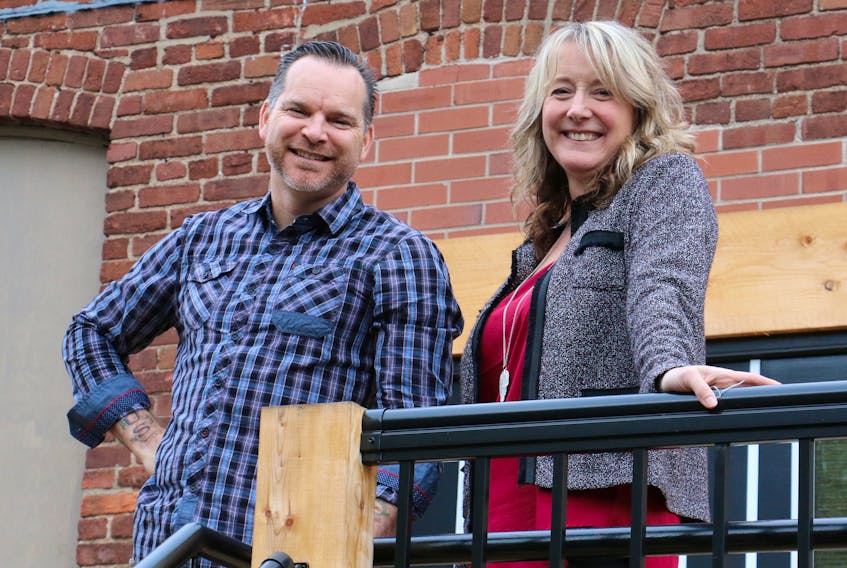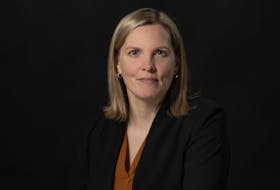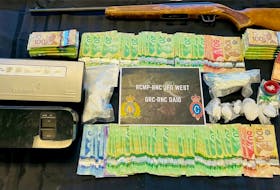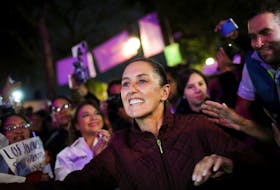WINDSOR, N.S. — Entering the front lobby of Landing Strong is not like walking into the lobby of a traditional clinic.
Situated on the top floor of the historic Cedar Centre for Active Health & Living building in Windsor, visitors are greeted to a warm, almost homey, atmosphere as soon as they pass through the front doors.
That’s by design.
Dr. Belinda Seagram says the space promotes a feeling of a place where healing can happen.
“We didn’t want it to feel institutional or clinical,” said Seagram, who founded Landing Strong with Doug Allen, a social worker and military veteran.

“We tried to create an atmosphere that’s calming and soothing. We’re dealing with people who have overtaxed central nervous systems; they’re already on alert. It’s not easy to stand down. We want a space that’s big, that’s welcoming,” said Seagram.
The non-profit treatment centre has been a vision of Seagram’s for some time. Seagram, who opened Seagram and Associates almost a decade ago, works alongside Allen at the Falmouth practice and announced earlier this year the upcoming launch of Landing Strong.
The grand opening was held on Sept. 27, and Seagram said the response from the community, especially those who may seek the service, has been positive.
Each intensive day treatment program will run for three months, five days a week, with the first program starting in the near future. Clinicians with specialized knowledge and training around military related trauma and first responder trauma are on staff.
The program not only focuses on mental well-being but physical as well. They have partnered with a certified yoga therapist and Dr. Matthias Jaepel, who is involved with exercise therapy training.
“We don’t want to be just tackling their current stressors. We want to be preventing future injury by helping them understand how to build resilience,” said Seagram.
“Landing Strong is a vision. It’s an idea that when people find themselves in a place where they have occupational stress injuries — perhaps they’re not doing well — we provide a solid place for them to land,” said Seagram.
And then they help them regroup, recalibrate and reclaim their lives as they build resiliency.
“We tell people that they’re not going to be the same person that you used to be, but you’ll be someone new who feels capable and confident and grounded and connected,” she said.

How the program works
Seagram said it’s a long road to recovery, which often starts well before entering the day treatment program.
“If someone has been hiding in their basement for a long time and not having any contact with the community, we don’t expect them to suddenly come out and join a group,” said Seagram.
“Our hope is that we will reach them through our virtual community, through Facebook, through Instagram, through Twitter. We have a Friday blog. We send out a whole bunch of free resources on the internet,” she continued, noting they offer campaigns that help people with varying levels of PTSD and occupational stress injuries, including caregivers and family members.
By having resources at their fingertips, Seagram said the aim is to give them “a sense of hope, knowing that recovery is possible.”
The online aspect allows people to reach out while remaining anonymous. When they’re ready, they are then invited to call the clinic and begin discussions. Then, as they feel more comfortable, they can undertake a needs assessment.
“A needs assessment is a comprehensive look at where they’re at, what their needs are, and coming up with really a very comprehensive treatment strategy for them,” said Seagram, noting that they then enter one-on-one therapy sessions before reaching the ultimate goal of seeing them enter the intensive group program.
“Everybody says they’re not a group person but what we find is once people really start feeling better — and we can get people a long way through the individual work — then they start feeling group ready. That’s the next really big step to reintegrating into society,” she said.
As the program progresses, the clients will start taking part in more community engagement activities.
Once the program concludes, the participants will still have a place to go. Fridays will be an open day to reconnect, share lunch and do something out in the community.
“I think in Canada we are in a bit of a crisis in terms of the need for services for people who are injured. Really good people have put themselves in harm’s way for our benefit and suffered great personal consequences. It’s our obligation to make sure that we take proper care of them,” said Seagram of the program.
“We don’t want to do that by shipping them out of province,” she continued.
“There’s no reason we can’t have a top-tier service here in the Atlantic Provinces.”
Seagram said they have partnered with groups conducting in-patient programming in Halifax. Landing Strong focuses on people “who might not need in-patient care but are interested in intensive support.”
While anyone can participate in the program, it is designed for people within driving distance as it is not an overnight treatment centre. A limited number of hotel rooms will be available for out-of-town participants.

Go Online
- Falmouth psychologist launching new treatment facility, comic book series to help tackle PTSD
- 'I probably would be a statistic': Former Annapolis Valley paramedic aiding those with PTSD through podcast
- Pension for Life for Veterans will help military personnel with PTSD, federal minister says during Hants County visit
- Truro man who suffers from PTSD hopes to help others with information card
New development in the works
Landing Strong is already looking to add to its programming.
Allen is working on a return-to-work program that will help complement the work being done at the treatment centre.
“This is about using the building blocks to redefine and recreate community for these people,” said Allen, who served 20 years in the infantry before becoming a social worker.
Allen says the program is going to be very hands on. It won’t be about discovering how to get a job, rather it will focus on finding a job that will best suit their skillsets. It’s about finding their passion and applying it in the workforce.
“They’re not put into the workforce to sort of discover it on their own. They’re able to work with someone to integrate safely and to see how things work and to get the growing pains out of transitioning from a very different culture back into a civilian community,” said Allen of the program’s goal.
Seagram said she’s hopeful some of the main program participants will transition to the workforce program as they will be able to help them identify their transferable skills.
“Some people will just want to do the three-month program to get themselves grounded and healthy and feeling stable... physically and mentally, and some people will want to go further and say ‘OK, how do I reconnect to civilian life through work?’”
Seagram said they’re hoping to have that program up and running early next year, but it is dependent on securing more funding.
As for the PTSD Hero Comics that Seagram launched to provide an illustrated therapeutic tool for people with PTSD, that series is doing well. The first book has been available for several months while the second installment will be released in November. The third installment, and a digital animation, is due out in February 2019.
“We want to make sure the information we’re putting out is accessible in as many forms as possible,” she said.
The treatment centre will also be hosting various workshops.
Coming up is a one-day workshop for caregivers, which is planned for the end of November.
“We all know that supporting someone you love who is struggling, that can take a toll on (the caregiver) and the entire family life,” said Seagram, noting the workshop will be a three-part series.
“It’s the whole idea that PTSD isn’t just something that affects an individual. It affects the whole community,” she said. “Recovery happens in supportive communities.”
To learn more about Landing Strong, or to begin receiving free online information to help with PTSD, visit: http://landingstrong.com/.










